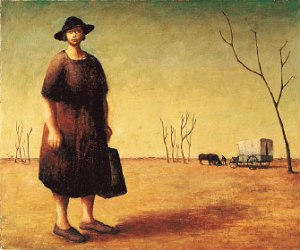One of the paradoxes facing the family historian is that he or she does not get to choose who or what to write about.
If you are a regular historian or biographer you are likely to be writing about people or events or places that interest you and that you already know something about. But if your ancestor was a limner in Victorian times, or a tipstaff in the Middle Ages, or – in my case, a farmer in 18th century New South Wales – you may just have your work cut out. And if the mantra ‘write what you know’ is anything like true then you are about to stumble blind down a long and tortuous alley.
 I have received a Heritage Grant from the Royal Australian Historical Society to write about my great grandfather’s exploits as a pioneer farmer in the Moree district in northern New South Wales. As a Londoner I know nothing about farming, not here in the UK and certainly not in 19th century Australia.
I have received a Heritage Grant from the Royal Australian Historical Society to write about my great grandfather’s exploits as a pioneer farmer in the Moree district in northern New South Wales. As a Londoner I know nothing about farming, not here in the UK and certainly not in 19th century Australia.

I can see two faint glimmers of light (three including the grant): the reminder from friends that when I complain yet again that this project is ‘completely beyond me’ that is exactly what I said when I was setting out to write my previous family book The Worst Country in the World.
The second comes from reading about the ‘new chums’: early settlers, usually young men migrating from England to ‘take up’ land in the new colony and make their fortunes, cheerfully confessing to having only ‘a vague idea of cattle as heifers, cows, bulls, and oxen, and as beasts that had horns, and made a great bellowing.’[1]
Starting from a point of total ignorance need not be an obstacle. Knowing nothing means you have no preconceptions, either about your subject matter or your readers’ expectations. But if you can’t get interested in your subject then you can’t expect your readers to either.
The process of researching land regulation and droving practices in 1830s New South Wales is like trying to get to grips with a foreign language such as Japanese: a sea of hieroglyphs on a page that mean nothing. But with a bit of luck and a lot of persistence, gradually those incomprehensible shapes start to make sense: the veil lifts, the light bulb flashes and Eureka: you’re in business.
So, as a way of turning ignorance to advantage I am making notes not just of what I’m learning and the sources I’m learning from, but of those light bulb moments.
My first moment came about with the help of a poem called Saltbush Bill by Australia’s unofficial poet laureate Banjo Paterson.
Now is the law of the Overland that all in the West obey —
A man must cover with travelling sheep a six-mile stage a day;
But this is the law which the drovers make, right easily understood,
They travel their stage where the grass is bad, but they camp where the grass is good,
They camp, and they ravage the squatter’s grass till never a blade remains.
Then they drift away as the white clouds drift on the edge of the saltbush plains…
Saltbush Bill was a drover of remarkable talents. The poem goes on to tell how he managed to extend his stay on a squatter’s land by picking a fight with the jackeroo (who was English, and a new-chum), making it last all day and allowing the jackaroo to win in the end so he could proudly return to the homestead claiming he’d licked the interloper; meanwhile Bill’s sheep had strayed way beyond the legal limit of half a mile from the track and spent the day merrily chomping on the squatter’s lush grass, scattering so far and so wide it took a week to muster them before Bill and his now well-fed mob could be on their way again.

On a more sober note, Henry Lawson’s The Drover’s Wife tells of the desolate and desperate isolation of a woman living in the sticks with her kids, her husband absent almost all the time, fighting snakes and loneliness, dressing up on Sundays to go for walks along the riverbank with her kids.

These wonderful pieces are an inspiration to this would-be biographer. They demonstrate how it is possible in a few short lines, or pages, to paint infinitely vivid pictures of early colonial life in outback Australia. The message this delivers to me is: when short of inspiration, look to the poets and the authors. Then once you’ve found the spark, and you can convey the excitement of it to the reader, you are well on the way.
Has anyone else out there experienced a light bulb moment?
[1] Edward Bell, quoted in Station Life in Australia by Peter Taylor

